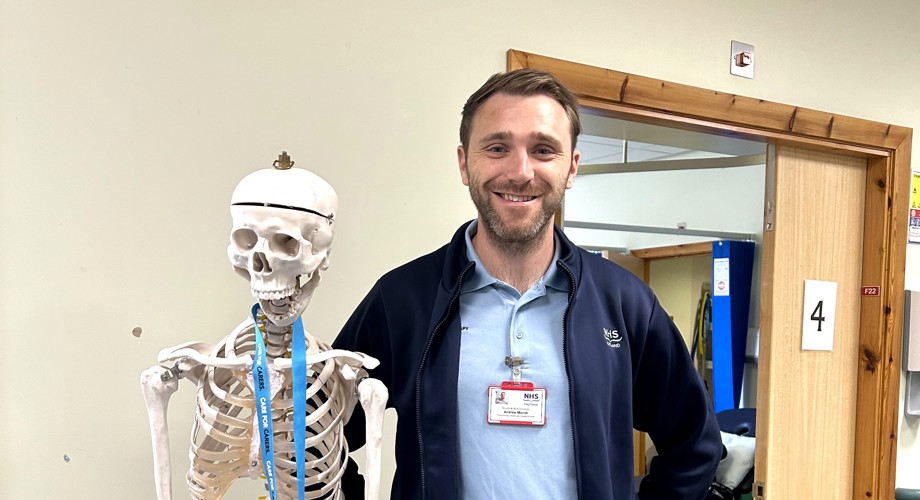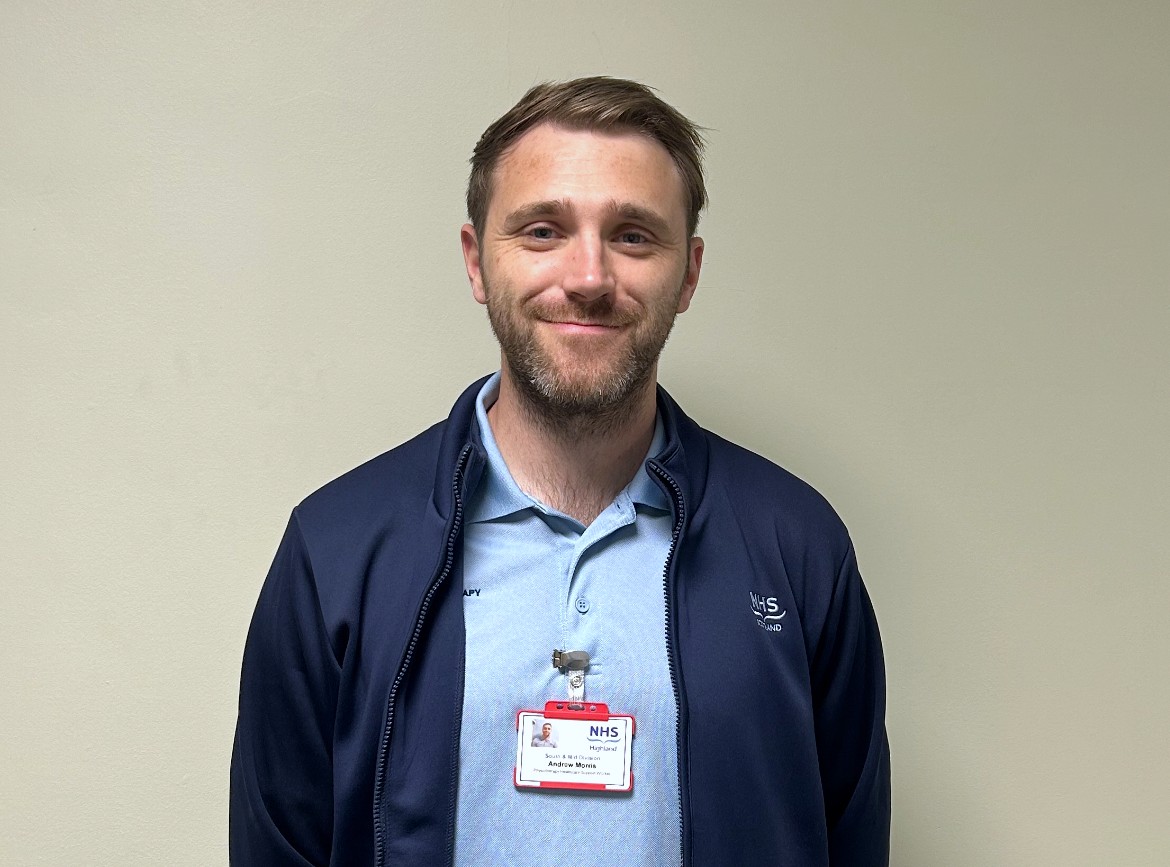
Andrew Morris
06 October 2025
•2 min read

From the gym floor to clinical rehabilitation
It all started with a love for sports and fitness at school. Like lots of people, I didn’t have a grand plan when I left. My instincts told me to follow what I enjoyed, so I found a part-time job at a local leisure centre.
That job led to an amazing opportunity as a Modern Apprentice gym instructor, which launched my career as a qualified personal trainer. I soon discovered a real passion for helping people with complex health needs. So, I began to specialise in cardiac and cancer rehabilitation.
This specialist work led me to partner with incredible organisations like the NHS and Maggie’s Cancer Centre. I realised I was naturally heading down a career path focused on rehabilitation.
Making a move to the NHS
I’d been encouraged by friends in physiotherapy who thought my skills would be a great fit for the NHS. So, when a role with the musculoskeletal (MSK) team at NHS Highland came up, it felt like everything was clicking into place.
Joining as a physiotherapy support worker wasn’t just a new job. It was the logical next step on a career path I am very passionate about.
Once in the role, I was keen to keep learning and growing. I focused on completing all the required training and competencies, which helped me earn a promotion to physiotherapy assistant practitioner.
What my job really involves
As a physiotherapy assistant practitioner in a busy outpatient clinic, no two days are the same. I work with a huge range of conditions, from fractures to chronic back pain, and typically see around 8-10 patients a day.
Here’s a snapshot of what that involves:
- Assessing new patients with diagnosed conditions, like joint replacements, based on set clinical protocols.
- Guiding one-to-one exercise sessions to help patients with their rehabilitation in our clinic rooms and gym.
- Leading group exercise classes, including hydrotherapy, osteoarthritis groups, and cardiac rehab.
- Managing my time effectively to keep appointments running smoothly for our patients and the whole department.
- Keeping detailed notes for medical records and sending letters to patients, GPs, and other health professionals.
- Meeting with my team to discuss patient cases and share knowledge from our ongoing training.
While I'm based in the outpatient clinic, I work closely with other teams across the hospital. Many patients are referred from orthopaedic surgeons, inpatient physiotherapists, and first contact practitioners who are physiotherapists based in local GP practices.
Staying in contact with these teams is essential. A patient might see several of us during their treatment, so we need to make sure the advice we give is consistent. It's a real team effort to make sure the patient's journey is as smooth as possible.
The skills that make a difference
To do this job well, you need more than just clinical knowledge. Two of the most important skills I use every day are communication and adapting.
- Communication—Giving the right advice at the right time is key to a patient's recovery. I have to explain things clearly, without overwhelming people with too much information. It's also vital for communicating accurately with colleagues and other health professionals about patient care.
- Adapting—I see a wide scope of patients of all ages and backgrounds, each with their own beliefs and attitudes. I have to adapt my approach to connect with each person and get them to engage with their treatment. It also means being ready to change a patient’s exercise plan if it’s not working for them.
Most people are really happy to see us, which is great. But you have to be realistic—it can be difficult to please everyone. People come in with different injuries and expectations, and sometimes what they want isn't possible.
The environment I work in lends itself to continuously developing as a person. Handling different personalities and situations is just part of working with people. I see it as an opportunity to strengthen my problem-solving and communication skills.
It's more than just massages
A lot of people think physiotherapy is just about massage, but that’s a common misconception. The reality is that the role is split between physical, hands-on tasks and desk-based work.
A huge part of what we do is based on communication. We look at the whole person – their lifestyle, their beliefs, and their attitude – not just their injury. This is sometimes called a biopsychosocial approach. It means we tailor our advice, education, and exercises to the individual to give them the best chance of recovery.
We also spend a lot of time "behind the scenes" on admin, documenting appointments and keeping up to date with the latest clinical guidance.
The rewards of my job
The most encouraging part of my job is getting feedback from patients that my guidance has genuinely helped. Seeing someone I’ve worked with get back to their normal way of life makes me proud to have been part of their journey.
I also work with a fantastic team! Every day, I see the incredible effort they put into patient care. They're friendly, approachable, and fun to be around, and everyone is always happy to help each other out.
Always learning
Learning is a constant part of my role, and there are so many opportunities to develop. It happens in different ways:
- Everyday learning—We have weekly meetings to discuss patient cases and informal chats every single day about different conditions and injuries. I’m always picking up new knowledge from my colleagues.
- Formal training—The whole team takes part in regular training days. We often have guest speakers, like consultants, who come in to present and share their expertise.
- Following your interests—For those of us who have a specific interest, the team is really supportive. I can arrange to shadow other health professionals or attend their clinics. I could even go and observe in surgery or orthopaedic clinics, which is an amazing opportunity!
A positive attitude is everything
The best piece of career advice I ever received was from a previous manager who said, “appoint for attitude and train for skills.”
He always said that in any career, a positive attitude is everything. You don't need every skill to get started. What employers really value is a great attitude and a willingness to learn. That advice has really stuck with me and has been essential for my career growth.
The best career decision I’ve ever made
Applying for my current role was the best decision I've made. My hours provide me with a much better work-life balance, and I get to apply my knowledge every day.
I’ll be honest, it was a massive change at first. During the first couple of weeks, I found it challenging and overwhelming, and I even questioned if I’d made the right decision. But I can now safely say I am a confident, well-established member of the team, though of course, there's always more to learn!
My ultimate goal is to become a fully qualified physiotherapist, and this role is the perfect foundation for that.

Could this be the right career path for you?
Has Andrew's story inspired you? If you're looking for a career with real purpose, this could be your next step.
You don’t need a degree to start. You just need the right attitude and a desire to help people thrive. Explore what the role involves and how you can begin your own career journey with NHS Scotland.